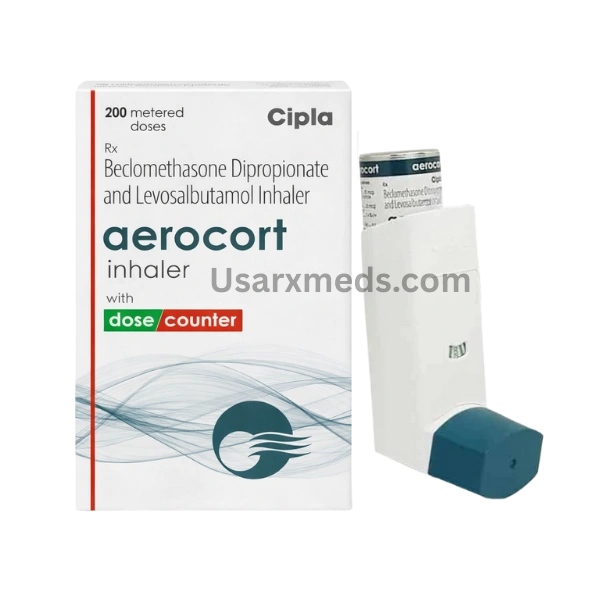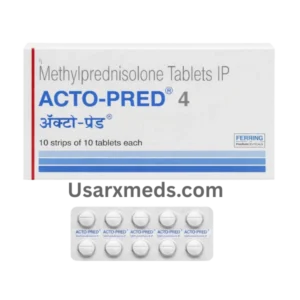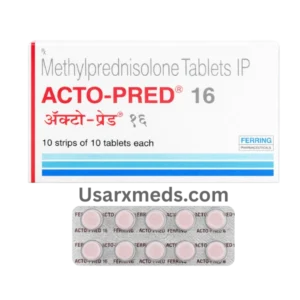Description
This article provides the key facts on Aerocort Inhaler, a usually recommended treatment for respiratory diseases, including COPD and asthma. Whether you are a new patient or thinking about changing to this medication, you will learn about its applications, advantages, possible side effects, and responses to the most frequently asked concerns. Let’s help you feel more confident in your health decisions and breathe better.
Understanding Aerocort Inhaler: A Complete Introduction
Managing asthma and chronic obstructive pulmonary disease (COPD), Aerocort inhalers are dual-action respiratory medications. Made by Cipla Limited, it boasts two active components:
- Beclometasone Dipropionate (50 mcg): A corticosteroid that reduces inflammation in the airways.
- Levosalbutamol (Levalbuterol): A bronchodilator that relaxes airway muscles, helping to open the lungs for better airflow.
Designed for direct inhalation into the lungs, every inhaler provides 200 metered doses (MDI).
How Does Aerocort Inhaler Work?
Aerocort works through a two-pronged mechanism:
- Beclometasone targets and reduces inflammation inside the bronchial tubes, decreasing mucus production and swelling.
- Levosalbutamol acts quickly to relax the smooth muscles in the airway walls, helping to relieve bronchospasm and make breathing easier.
Perfect for daily symptom relief and long-term treatment, this powerful combination offers both fast relief and preventative control.
Uses of Aerocort Inhaler
Doctors commonly prescribe an Aerocort Inhaler for the following conditions:
- Asthma (mild to moderate)
- Chronic Obstructive Pulmonary Disease (COPD)
- Bronchial inflammation
- Exercise-induced bronchospasm
- Seasonal or allergic airway inflammation
As suggested by a doctor, it is appropriate for adults as well as children.
Side Effects of Aerocort Inhaler
While most consumers find it well-tolerable, some could have negative effects:
Common Side Effects:
- Hoarseness or throat irritation
- Dry mouth or cough
- Headache or dizziness
- Mild tremors
Less Common but Serious:
- Oral thrush (fungal infection in the mouth)
- Rapid heartbeat or chest pain
- Muscle cramps or fatigue
- Allergic reactions (rash, swelling)
Advice: Rinsing your mouth following inhalation helps ward against fungal diseases.
Why Choose Aerocort Inhaler?
Healthcare experts generally trust the Aerocort Inhaler because of its dual-action benefits and balanced benefits. It not only treats acute respiratory problems but also acts over time to lower inflammation and enhance lung capacity. Usually causing less systemic negative effects than oral drugs, the medication is breathed directly and operates faster. Its small size also makes carrying and using it simple at home or on the job. Designed by reputable pharmaceutical company Cipla, Aerocort Inhaler provides dependability and effectiveness for people with persistent asthma or COPD control.
Final Thoughts
For those with COPD or asthma, the established, dependable Aerocort Inhaler (Beclometasone/Levosalbutamol) has its dual-action approach that controls long-term inflammation and provides fast relief of symptoms. Aerocort will enable you to breathe easier and live better, whether your daily breathing problems are under control or flare-ups are avoided.
Top Frequently Asked Questions (FAQs)
1. How should I use the Aerocort Inhaler?
Shake well, exhale, then inhale deeply while pressing the inhaler. Pay great attention to your doctor’s instructions.
2. How many doses are in one inhaler?
Each inhaler contains 200 metered doses.
3. Is it a rescue inhaler?
It provides fast relief but might not replace emergency bronchodilators in severe episodes.
4. Can I use it every day?
Yes, it is typically prescribed for daily maintenance. Always follow your doctor’s instructions.
5. Can children use Aerocort?
Yes, but only under pediatric supervision.
6. Does it lead to tiredness or sleep disorders?
Unlikely. While some would feel restless or anxious, sleepiness is unlikely.
7. Can pregnant women use Aerocort?
Only if prescribed. Discuss risks and benefits with your healthcare provider.
8. What should I do if I miss a dose?
Get it right away when you remember. Never double up; skip if your next dose is almost here.
9. Can I use it with other inhalers?
Yes, but inform your doctor about all medications you’re using to avoid interactions.
10. Is it safe for long-term use?
Indeed, under medical supervision, utilized properly, it is safe and efficient for long-term management.










Reviews
There are no reviews yet.